 In the past months, the “European Virtual Seminar on Sustainable Development” (EVS) once again provided a unique learning sustainability experience. Almost 20 years after its creation, the EVS continues to be an innovative e-learning course. It fosters international and multidisciplinary exchange between staff and students who collaborate through ICT. The organizational model of the EVS is based on a flexible network of universities (including four CA members) who invest staff and resources and recruit students.
In the past months, the “European Virtual Seminar on Sustainable Development” (EVS) once again provided a unique learning sustainability experience. Almost 20 years after its creation, the EVS continues to be an innovative e-learning course. It fosters international and multidisciplinary exchange between staff and students who collaborate through ICT. The organizational model of the EVS is based on a flexible network of universities (including four CA members) who invest staff and resources and recruit students.
The course deals with different topics of sustainability that are presented as case studies (sustainable tourism, urban climate adaption, etc.). Groups of four to seven students from different universities work together on one topic, first defining their idea in a research proposal and later on writing a scientific report. The learning and research process is facilitated by staff members of the involved universities who support the student groups as tutors and experts. Students practice to communicate and collaborate across the boundaries of nations, cultures and disciplines, and acquire essential competences to foster sustainable development that involve content-related knowledge as well as personal, social and technological skills. Reflection reports at individual and group level enhance the learning effect.
The EVS proves that online education can be a suitable format for sustainable development in many ways. One student summarized her experience as follows: “In times when the idea of European solidarity is vulnerable, EVS is a way for me to position myself as a European citizen and to show and experience how great it is to achieve our aims together at a European level.”
